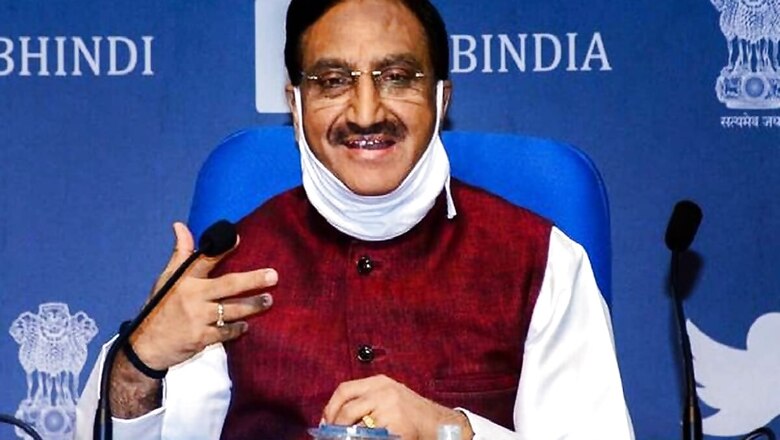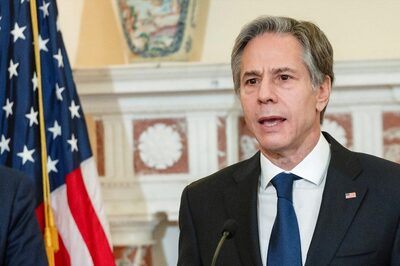
views
All states and Union territories can open schools for all classes of all coronavirus-related guidelines are followed strictly, said Union Education Minister Ramesh Pokhriyal ‘Nishank’. In an exclusive interview to News18, Pokhriyal said allocation for education has been increased in the Budget at all levels.
Edited excerpts:
Now that vaccines have come, when are schools and colleges likely to open fully?
Yes, it is true that if we have asked the states to reopen the schools and colleges in a phased manner after consulting the Home and Health ministries. According my information, approximately 32 states have already opened schools from classes 9 to 12, three states have reopened schools for classes 1 to 12. So the 32 states have reopened the schools and they will begin start classes for junior sections in a phased manner. I believe an atmosphere has been made and a pressure is building up on students, although guardians are wondering whether to send their children to schools. However, when the Dhauli Ganga incident happened, I went there and on the way, I spoke to students of a Kendriya Vidyalay in Joshimath and they were happy.
They said they were anxious sitting back at home and they wanted to return to school and that they will be disciplined at the school and study well. So when a child gets the atmosphere of a school and sees their friends, they feel they should go to school. I believe guidelines issued to the schools and organisations if followed in the country, then all schools can reopen and stay safe too.
How much focus has been placed on education in the Atmanirbhar Bharat budget?
When you are talking about Atmanirbhar Bharat, you know our PM (Narendra Modi) has said a couple of things, one being 21st Century’s Golden India — India that is beautiful, clean, Aatmanirbhar (self-reliant) and the one which is best. Secondly, the new education policy is the base of a new India and it has been accepted by all and is in talks all over the country and the third thing the PM said is that we want a 5 trillion dollar economy.
You must have noticed that in school education, lessons are being given for startups and a special budget has also been allocated for this. To make students self-reliant, we are introducing vocational education for students of class 6 with internship and this would be unique. We will teach artificial intelligence to students and this will surely help one move towards self-reliance. There one-nation-one-digital platform and one-class-one-channel programme where already 32 channels are on.
Hence, I think for Atmanirbhar Bharat, the research is going on and Rs 50,000 crore has been allocated for National Research Foundation in this budget so that there is international-level research. And these researches must move towards startups and the students here should not opt for foreign countries, but begin their own startups here. For higher studies, we will form higher education commission under which four councils will be set up and under this 15,000 new schools will be developed as model schools for self-reliance. We want to strengthen all 22 languages that India has. So we will work hard towards translations. There are many such schemes that will take India ahead and make it self-reliant.
The Opposition has said the provisions in this budget are 8% lesser than the previous budget. What do you have to say in this regard?
I suggest the opposition to read. I want to tell those who tell that 8% of the budget has been reduced, if you look at school education budget for the year 20-21, the allocation was about Rs 52,100 crore, while the budget is Rs 54,873 this year. It is approximately 5% more. If you look at higher education, then for the year 20-21, it was Rs 32,900 crore, this time, it is Rs 38,350.65 crore. Not just that, for research Rs 50,000 crore that has been allocated is different than that of the school and higher education budget. Besides, Rs 3,000 crore has been separately kept for apprenticeship. There are many places where investments have been made. I did not include HIFA, for which we will invest 1 lakh crore till 2022. So it is not that the budget has been brought down, but it has been increased and I thank our FM (Nirmala Sitharaman) for that.
Under the National Education Policy (NEP), 15,000 schools will be developed as model schools. What’s the thought behind this as there are more than six lakh schools in the country.
True, there are more than 15 lakh schools. As far as the 15,000 schools are concerned, they will be upgraded with full force. These schools will provide leadership to all schools to take NEP to the lowest levels.
These are historic steps. These schools will be very modern and a step in the direction of implementation of NEP.
What’s the focus area for you?
Given the circumstances, the focus is on policy. Before Lord Macaulay, India had many universities like Nalanda and Taxila. People from all over visited these universities for education. We want to restore the lost glory. The NEP is based on students learning their native languages at the base level and then moving to science and research.
The world has appreciated NEP. Cambridge has said there is a lot of opportunities in the policy. The first priority is to start NEP and we have done that. We are the first nation to teach AI at such levels — 360 degree holistic evaluation of students.
There is a lot of flexibility, academic credit banks being set up for students who miss out on academic year due to circumstances. The focus is on research and vocal for local. This NEP is global — impactful, interactive, innovative and inclusive. We will have content as well as patent. NEP has the possibility of unlimited change and that is our priority.
At present, circumstances are being created where India’s image is being tarnished. What do you have to say on this?
The image of India has changed drastically under Modi. Today, India stands united. The image of India has improved under Modi. In a democracy, protests do happen, but in the name of politics, few people did something to malign the image of the country and everyone has condemned it. The PM has always worked in the interests of farmers. The decisions and reforms undertook by Modi govt were never taken in the last 70 years. The three farm laws should be discussed about its flaws if there is any, but the opposition has remained silent on that and could not do that. The PM is working for the benefit of the people. The reforms are for the benefit of the farmers.
Civilisational values, cultural heritage, menstrual hygiene and environmental consciousness are such issues that need emphasis and focus. What is being done on this?
All these things are part of NEP – one-student-one-tree programme, their sustenance and even students working towards water conservation. Whether Swachh Bharat, Ek Bharat, Shresthh Bharat or other programme—all are aimed at growth of our students.
Read all the Latest News, Breaking News and Coronavirus News here


















Comments
0 comment